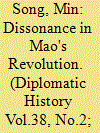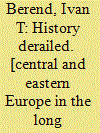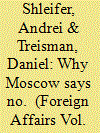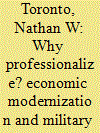|
|
|
Sort Order |
|
|
|
Items / Page
|
|
|
|
|
|
|
| Srl | Item |
| 1 |
ID:
073933


|
|
|
|
|
| Publication |
London, Routledge, 2006.
|
| Description |
x, 240p.hbk
|
| Series |
Routledge Advances in Korean Studies
|
| Standard Number |
0415321921
|
|
|
|
|
|
|
|
|
|
|
|
Copies: C:1/I:0,R:0,Q:0
Circulation
| Accession# | Call# | Current Location | Status | Policy | Location |
| 051678 | 951.95043/KIM 051678 | Main | On Shelf | General | |
|
|
|
|
| 2 |
ID:
132023


|
|
|
|
|
| Publication |
2014.
|
| Summary/Abstract |
Following President Richard Nixon's visit to China in February 1972, U.S.-China trade increased almost ten-fold within three years, of which China's agricultural imports represented the largest category. This trade created unprecedented opportunities for the Chinese pragmatists to pursue economic modernization, and sharpened the conflict between them and the radicals who adhered to Mao Zedong's ideological crusade. Drawing on both English and Chinese sources, this article examines the fluctuations of China-U.S. agricultural trade between 1972 and 1978. It focuses on the process of trade management in an ideologically charged environment, specifically, the interactions between the pragmatists and radicals under the dominance of Mao. It argues that this trade brought tremendous pressure on the very framework of that Chinese system, tested the boundaries of Mao's revolutionary ideology, and encouraged a fundamental change of course in China.
|
|
|
|
|
|
|
|
|
|
|
|
|
|
|
|
| 3 |
ID:
086027


|
|
|
|
|
| Publication |
2009.
|
| Summary/Abstract |
Last July, more than 200,000 people flocked to a public park in Berlin to hear Barack Obama, then the Democratic candidate for president of the United States, deliver a speech calling for renewed transatlantic partnership and cooperation. The choice of Germany's long-divided capital as the backdrop for his only public speech in Europe was deliberate. To the Germans listening to him that summer evening in the Tiergarten, Obama made a special appeal, citing "a set of ideals that speak to aspirations shared by all people," the same "dream of freedom" that was the basis of the relationship between the United States and West Germany during the Cold War. Now that Obama is president, will Germany respond to the call and join the United States as a key European partner in addressing global challenges and threats?There are many reasons for Germany to rise to the occasion. For one, there is a dearth of leadership elsewhere in Europe. The European Union remains embroiled in a debate about institutional reform. In the United Kingdom, Prime Minister Gordon Brown -- despite his confidence during the current financial crisis -- remains disengaged from both the EU and the transatlantic alliance. French President Nicolas Sarkozy, meanwhile, shows more Atlanticist inclinations than any of his predecessors, but he has yet to prove that he can build lasting coalitions in Europe or convince his country of the need for economic modernization.
|
|
|
|
|
|
|
|
|
|
|
|
|
|
|
|
| 4 |
ID:
045950


|
|
|
|
|
| Publication |
Berkeley, University of California Press, 2003.
|
| Description |
xx, 330p.: ill.Hbk
|
| Standard Number |
0520232992
|
|
|
|
|
|
|
|
|
|
|
|
Copies: C:1/I:0,R:0,Q:0
Circulation
| Accession# | Call# | Current Location | Status | Policy | Location |
| 046954 | 943.0009034/BER 046954 | Main | On Shelf | General | |
|
|
|
|
| 5 |
ID:
107318


|
|
|
|
|
| Publication |
2011.
|
| Summary/Abstract |
The international scientific conference "Long-term Forecast of Socio-economic Development of Megaregions (Pacific Russia-2050)" held in Khabarovsk on November 19-20, 2010, was devoted to forming a scientific substantiation of the development of the Russian Far East. It was organized by the Far Eastern Branch of the Russian Academy of Sciences, the Interregional Association "The Far East and Trans-Baikalia" and the Institute of Economic Research of the Far Eastern branch of the Russian Academy of Sciences, which specialize in the problems of the scientific foundation of the socio-economic development strategy of the eastern regions of the Russian Federation.
|
|
|
|
|
|
|
|
|
|
|
|
|
|
|
|
| 6 |
ID:
122366


|
|
|
|
|
| Publication |
2013.
|
| Summary/Abstract |
Eurasia is not the same as the post-Soviet space, and its borders cannot be regarded as fixed once and for all by the Soviet past. Whereas the post-Soviet space can indeed be the best region for integration in certain aspects, other options might envision a different combination of countries.
|
|
|
|
|
|
|
|
|
|
|
|
|
|
|
|
| 7 |
ID:
134133


|
|
|
|
|
| Publication |
2014.
|
| Summary/Abstract |
This article looks at the goals, conditions, and possible consequences of Kyrgyzstan's accession to the Customs Union (CU) and Common Economic Space (CES), describes the current state of the country's export and import situation, and analyzes the role of re-export in the Kyrgyz economy in the past decade. It studies the alleged positive effects and risks that could arise if Kyrgyzstan joins the CU and CES and presents the data of an analysis of the comparative advantages of commodity groups. The authors justify the importance of pursuing a coordinated policy with the other CU countries to develop priority industrial and agricultural sectors. This will encourage large companies to come to Kyrgyzstan and open their branches in the country, as well as help to solve tasks aimed at modernizing agriculture and creating an agroindustrial cluster.
Keeping in mind that commodity flows and business will have to undergo major reorientation after the country joins the CU and CES, the authors conclude that a certain transition period will be needed to enable gentler adaptation of the economy. The authors propose creating a mechanism based on EU experience within the CU and CES to support countries with slower rates of development.
|
|
|
|
|
|
|
|
|
|
|
|
|
|
|
|
| 8 |
ID:
100576


|
|
|
| 9 |
ID:
159569


|
|
|
|
|
| Summary/Abstract |
Why do states professionalize the military? Professionalizing the military represents a strategic commitment to a particular set of ideas about the role of the military, and the timing and strength of this commitment to military professionalism have varied widely between countries, especially non-European ones. Understanding this process is important in an era of defense austerity, when the choice of how to spend defense resources has deeper political consequences than it used to. Despite the importance of this question, there have been almost no large-n studies of military professionalization. Analyzing new data on more than 150 countries from 1800 to 2005, this study finds that states with greater levels of human capital, urbanization, and economic wealth are more likely to professionalize. What is more, these indicators of economic modernization have a substantially stronger correlation with measures of military professionalism than regime type and international security concerns. These findings should inform security assistance operations by emphasizing the development of human capital in recipient officer corps and drawing links between economic development and security assistance programs.
|
|
|
|
|
|
|
|
|
|
|
|
|
|
|
|
|
|
|
|
|